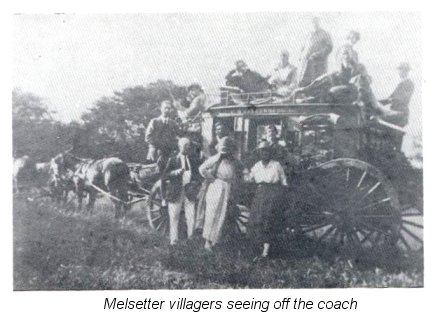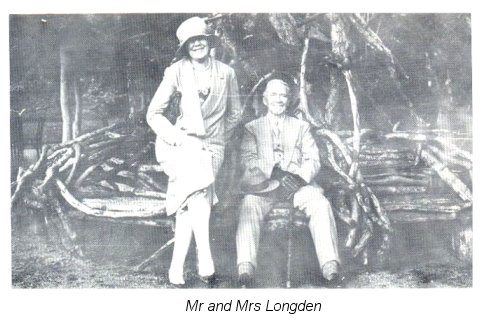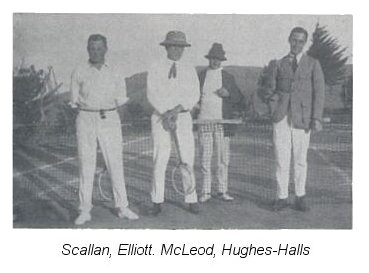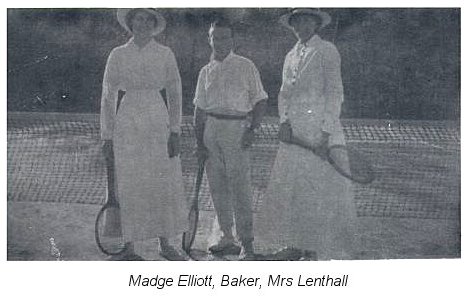Marie, daughter of H. D. Martin (Mrs. Hack), left Melsetter for school
in Bulawayo. The night before they left it rained steadily, but the morning
dawned fair and, with servants carrying her scoff box and tin trunk, she went to
the market square to board the coach. Nearly all the villagers were there as the
weekly arrival and departure of the mail-coach was a big event, not lightly to
be missed. Six passengers could be carried in two rows of three facing one
another with knees almost touching, but as there were only four Marie, Connie
McLeod, Mr. Lenthall and a Post & Telegraphs technician � they travelled in
great style and comfort. Luggage and mailbags were secured to the back of the
coach and covered by a tarpaulin. Final goodbyes were said, they took their
places, the Cape coachman mounted his high seat, his assistant leapt up beside
him, and with whip cracks, the clatter of hooves and a blast from the bugle,
they were off.
The team was fresh and the pace brisk as the coach rounded the shoulder
of Pork Pie and past Rocklands. Then came the long, heavy pull up and yet up,
till the nervous preferred not to look outside to the awful depths below.
Rounding sharp bends the leading mules had to keep to the extreme edge of the
narrow road, and clods flung up by their hooves dropped sickeningly out of
sight. On and on, then down the impossibly steep pass at Komiek Nek, round to
Steynsbank and a fresh team of mules, and an opportunity of stretching legs and
having tea and a bite. The new team had a long haul up and round to Rutherfurd�s
Hid, and then down the valley, across the Umvumvumvu, and on to the Half Way
huts where they spent the night.

The mountains, with very real hazards in those wet conditions, were
behind them, and ahead was comparatively uninteresting country, with minor ups
and downs though with large rivers to be forded. Next morning, due in Umtali
that afternoon, they were wakened by the bugle to a sodden world.
They found the Mpudzi river in flood, but after a short delay the water
appeared to have subsided, so the coachman said that with the fresh team ready
there they should be able to cross. With brakes locking the back wheels and
mules struggling to keep their feet on the slippery surface, the steep slope
down to the ford was negotiated. Halfway across the river disaster struck. A
wall of water swept through the coach, carrying downstream nearly all their
belongings and the helpless mules, hastily cut free by the quick-thinking
driver. One poor beast was drowned, but the others struggled to safety some
distance away.
There they were: four fare-paying passengers and two Zeederberg
employees, soaked to the skin and perched precariously on the rocking, teamless
coach in midstream. Connie, dressed incongruously in smart coat, new hat and
brown gloves, swam back, battling bravely through the waves.
Africans came from the coach stables and formed a human chain from bank
to coach, back along which they all struggled to safety. A fire was made and
they dried themselves as well as possible. The position was not good: nearly all
their belongings had gone, they had no food, and learned that return to
Melsetter was impossible as the road behind was cut by another stream, normally
a trickle but now a raging torrent. They got in touch with the Newnham family
who were camped close by and soon exhausted their limited food supplies. Before
the adventure was over they were eating crushed mealies kept at the coach
station for the mules.
The Post & Telegraphs man had saved a portable telephone from the
flood and climbed a telegraph pole, attached the instrument, and got news of
their plight to Melsetter. Elliot organised teams of bearers to bring food, but
they returned to report failure, and finally the Martins� faithful old servant,
Bye-and-Bye, managed to reach them with a box of supplies.
In order to rescue the Newnhams and the coach party the Umtali
Magistrate sent out a trolley and oxen for which, owing to A.C.F. restrictions,
a special permit had to be obtained, and also sent mealie-meal and flour for the
Overseer. The road was washed out in many places some ten and fifteen feet and
several landslides had blocked it, and all traffic was suspended.
In Umtali Marie was taken in by Mr. and Mrs. Jim English and was looked
after by their motherly housekeeper Miss Lettie Kloppers. The 100-mile journey
had taken a week instead of two days.
Marie had hoped that on reaching civilisation her troubles would be
over, but she was involved in a train accident near Rusape where a culvert had
been washed away. Eventually she reached Salisbury, was re-equipped by her
sister, and reached Eveline Girls� High weeks late, and her trunk reached the
school about a month later.
It was weeks before the next coach got through to Melsetter. The
carriers swam the flooded rivers with mailbags on their heads, and exchanged
bags halfway; letters only were carried, newspapers and parcels posted in
Salisbury in January reached Melsetter in April. Transport wagons were held up,
provisions became scarce, and drink ran out altogether; some residents suffered
badly from thirst and did not enjoy being teetotalers, and the first coach to
arrive bringing a cargo received a tremendous welcome.
During February the CC. telegraphed successive overnight high
rainfalls, and said that if it continued to rain as never before even runners
would not be able to get through. The roads were everywhere impassable for
vehicles, and it was useless spending money trying to mend them until the
weather cleared.
The official figures, from 1st November 1917 to 31st March 1918, were
94.25� in the township, which was less than in many other parts of the district.
There was serious mortality among stock as young cattle and donkeys died in
considerable numbers, and sheep and goats died in hundreds.

During March all official correspondence was carried out in very long
telegrams, and the C.C. appealed for a road engineer to come and direct
operations or tell him what to have done. Gangs worked on sections of the road
to make them passable, and the Overseer, again short of food and imprisoned
between unfordable spruits, dealt with severe damage.
By 16th April private conveyances had come through and the coach
service started again soon afterwards, but it was months before more than urgent
temporary repairs could be done to the road.
The road through Chipinga to Mount Silinda was a Government
responsibility, but it got little attention and was mostly in a shocking
condition. In 1918 a gang repaired some of the damage done at the beginning of
the year, and the Nyahode drift was descnbed as not being able to stand a
rainstorm as it had been built with very light material and had no batters
whatever.
Baboons were very troublesome, and hunts were arranged under the
control of the N.C., who supplied natives to help when necessary. Lee-Enfield
ammo was issued free, with unexpended rounds being returned to the N.C.;
ammunition for other rifles and for shotguns expended during a hunt was paid for
on application to the C.C.
A quantity of wool, several hundred bags of wheat,
and a little dairy produce were sent to market, but Melsetter was at the time
affected by the general depression after the War.
As there was a spell with no further deaths from A.C.F., farmers,
merchants and other residents urgently requested that the quarantine
restrictions be lifted to allow ox transport between Melsetter and Umtali.
Donkey transport was unobtainable, no mealies or grain for native food could be
bought locally, the farmers were asking prohibitive prices for wheat, and
necessaries for the European population were becoming scarce. Later in the year
restnctions were partly removed, and an Imperial Cold Storage buyer bought some
2000 head of stock.

In spite of drawbacks, advances took place in the village and
day-to-day life carried on. Lethbridge retired from the Police and took over the
house in which Meikles� Managers had lived (today�s Hotel cottage), and opened
the first fully licensed hotel, a great boon to travellers. Later several
bedrooms were added, and a large stable was erected capable of accommodating a
dozen horses.
The C.C. reported that a healthy sign was the erection of a large and
commodious store: the stone building which still stands sturdily today, built at
the instigation of John Meikle. Meikle Brothers had had a General Dealer�s
certificate since 1911, the first issued by the Melsetter Licensing Board. The
building of the store, supervised by a contractor, involved many residents: the
stones were laid by Daantjie Steyn, Stoffel and Schalk Kloppers, Tom Williams
and Barnie Marais, and the stones were lifted to the top of the wall by a small
crane. Karl Neeser did the carpentering with timber most of which Andnes Kok cut
in the Nyamarirwe valley in the Greenmount forest: after felling a tree, he
sawed it into 18� lengths and rolled each length onto the sawpit alongside, and
with the help of two boys got the pieces cut through, taking about three weeks
to cut one tree.
C. L. Mulling managed Meikles� Store assisted by George Gifford, who
also acted as Court Interpreter upon occasion. After Mulling came Fred Taylor,
later of Taylor & Nisbet and of Manchester Park, which he left to the
nation: today�s Vumba National Park. Carey Bland was the next manager.
There were small stores on many farms, and the other store in the
village was owned by F. E. Ctonwright. At that time Mr. and Mrs. Cronwright
lived at Jersey farm and his Melsetter store was managed by H. D. �Leggy�
Martin, no relation of the pioneer Martins, who was assisted by Mike Kok and
Abraham Olwage. The African side of
Cronwright�s business was run for many
years by Frans Majeji who farms today at Biriwiri T.T.L.

Store managers got �15 a month, with goods at trade prices. Farm
managers got �10 to �15 with house, free use of land required, a percentage of
increase and in some cases free riding horses. Farm labourers got 15/- a month,
cookboys 20/- to 30/-, houseboys and gardenboys 15/- to 20/-, all with food and
quarters.
Government officeboys and storekeepers drew 35/- a month and provided
their own rations. In 1920 the C.C. applied successfully for an increase of 5/-
a month for employees with a certain length of service, as all were married with
families, and a paraffin tin of meal cost 5/-, which was altogether beyond their
means. The cost of a prisoner had risen to about �45, with discipline over �28
and maintenance �16.
There was no butchery but game, especially bushbuck, was plentiful.
Chickens were 9d each from the natives. Farmers sold sheep for 30/- each, which
were killed and dressed by house servants; a meat saw and chopper were normal
kitchen equipment. Word was sent round when a farmer occasionally killed a young
ox, and the villagers went out to the farm and got a big piece of meat which
they then cut up as best they could; beef was such a treat that nobody minded
how far they went to get it.
Madge Elliot was glad to be taken on in the Office when Arthur Bill
joined the forces, as life was very dull for the young; social occasions were
rare but enjoyed by all when they did occur.
Mrs. Bertie Remmer was the character of the district, much loved and
very good to the young; all had a healthy respect for her too, and from the CC.
down everyone did what they were told very quickly when she talked. She objected
strongly to the imposition of wagon licences, and was highly incensed when her
wagon was impounded for not having a licence. However, when life got
particularly dull a young policeman would say: �Ma, what about a party?�
Mrs. Remmer always said: �Oh, you boys , but never said no, and to
the parties in her house the young all made their way on foot, carrying
hurricane lamps unless there was a moon, from the School, the Residency, the
Police Camp and from below the hotel. Music for dancing was provided by
concertina and mouthorgans and by Mrs. Remmer�s piano, played by young policemen
or by Mrs. Stanley who had been a music mistress or by the school teachers or
one of the others, as most could play a little. When Mrs. Remmer said: �That�s
enough now. Time to go home�, off they all went.
Her piano was borrowed for occasional dances organised by the War Fund
Committee, when it was carried to the Courthouse and back by the prisoners.
Everyone went to all the Olwage weddings and danced all night in a tiny little
room with the dust rising; their harmonium was used for hymns on Sunday and
dance music on other occasions.